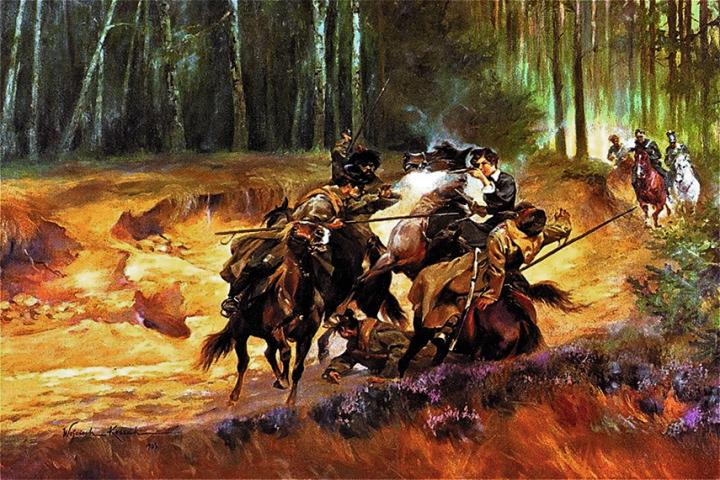 |
| Plater immortalized in a skirmish. |
She vowed not to abandon her military uniform once committed to the cause in 1831. She was given command of her own unit and promoted to captain, the highest rank for a woman of that time. Unfortunately, in the midst of the Uprising, she caught a fever that ended her life within a few days.
A poem by Adam Mickiewicz, national poet of Polan, Lithuania and Belarus, furthered the romance of the young warrior.
 |
| Monument to Plater |
Before yon hut, with measured pace,
The sentry marches to and fro;
Crowds throng the door, and every face
Is pale with terror and with woe.
What hero, honored and renowned,
Within, upon his death-bed, lies?
Hark! a clear voice with trumpet sound,
Comes mingling with the mourners' cries:
"Saddle my steed once more for me,
Who shared with me so many a fight!
That noble steed, oh, let me see,
Before I close my eyes in night!
My sword and belt, too, let them lie,
And all my trappings, at my side:
Gazing upon my arms will I
Die as the brave Czarnecki died!"
And when the steed was led away,
The priest bore in the holy bread;
 On bended knee the people pray —
On bended knee the people pray —The soldiers' cheeks are pale with dread.
Old scythemen who, without a tear,
Poured blood, in Kosciusko's day,
From their own veins and foemen's — here
Weep, as the parting prayers they say.
The chapel bell, at early dawn,
Toll for the parted soul they hear;
And now the soldiers all are gone,
For that the Muscovite is near.
Peasants crowd round the warrior dead,
He clasps the cross as when he died;
Upon his saddle rests his head,
His sword and fire-arms by his side.
But whence this virgin cheek, they said,
And bosom femininely fair?
Now save us, Heaven! It is a maid!
Emilia Plater slumbers there!
No comments:
Post a Comment